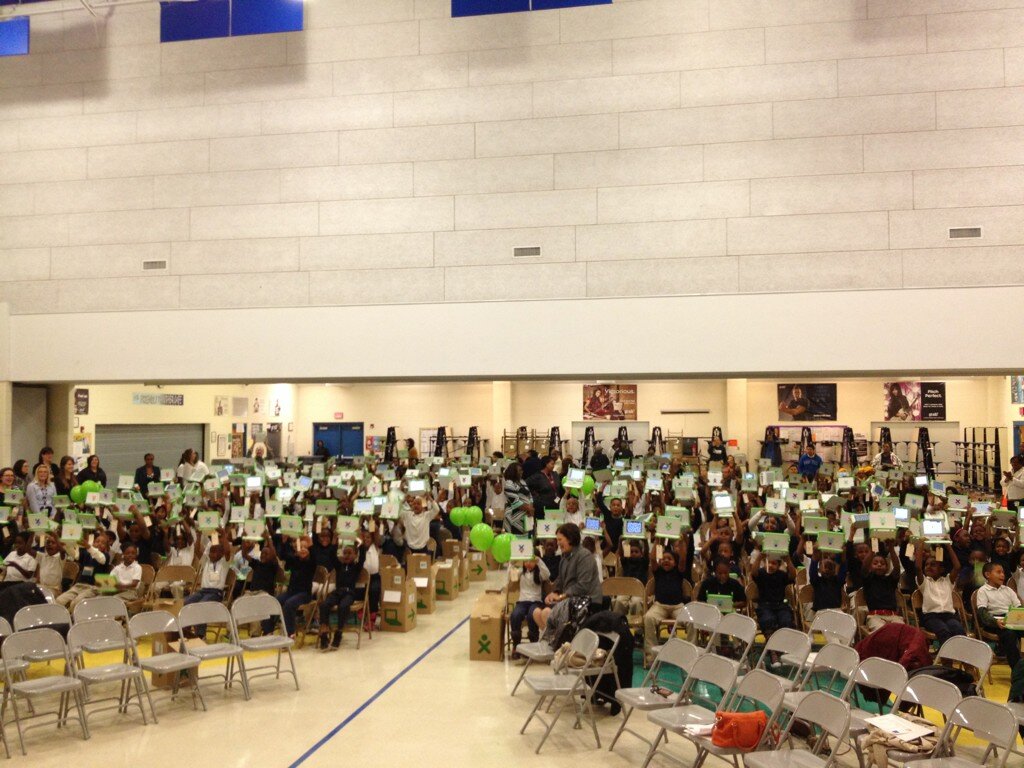Making Digital Literacy a Reality for Everyone
Queens’ Knight School of Communication takes another step toward making Charlotte a model city for digital literacy
WHO:Â The James L. Knight School of Communication is launching a digital literacy initiative at Ashley Park Elementary School, a school within the Project L.I.F.T. corridor. Project L.I.F.T. is a non-profit organization that transforms the way students who traditionally perform poorly in school are educated, focusing on nine schools within Charlotte Mecklenburg Schools (CMS).
WHAT: The Knight School has partnered with CMS, One Laptop per Child, Mobile Beacon and EveryoneOn to clear away digital literacy obstacles for Ashley Park Elementary families and assist parents who cannot keep pace with the technological literacy required of their children. The Knight School will assess families’ technology needs; Mobile Beacon is donating 100 modems and is providing free in-home Internet access for the remainder of the school year to participating families; and One Laptop per Child has already provided students with computers. The initiative aligns with the Knight School’s overarching mission—to raise the digital media literacy rate of the city to improve the lives of Charlotteans—and the launch day will be celebrated by a Mayoral Proclamation.
WHY: The focus on Ashley Park Elementary follows the Knight School’s Digital Media Literacy (DML) Index, the first tool of its kind to produce a comprehensive view of DML competency across a municipality—in this case, the city of Charlotte. The community surrounding Ashley Park scored the lowest on the Knight School’s Charlotte area index; a deeper look at the data revealed the neighborhood has the lowest Internet use, contains the highest percentage of adults without a high school degree and has the highest percentage of households with an annual income less than $40,000.
WHERE:Â Ashley Park Elementary School (Media Center)
2401 Belfast Drive, Charlotte
WHEN:Â The Second Annual Digital Media Literacy Day, an initiative launched in 2013 by the Knight School
Friday, March 21, 2014, 9-10 a.m. and 4-5 p.m
MEDIA OPPORTUNITIES:
- Remarks by Dean Eric Freedman of the Knight School on the significance and importance of the initiative
- Students and parents becoming more digitally literate – receiving lessons on how to use their computers, some who will be using computers for the first time
ABOUT THE JAMES L. KNIGHT SCHOOL OF COMMUNICATION AT QUEENS UNIVERSITY OF CHARLOTTE
The mission of the James L. Knight School of Communication is to prepare consumers and creators of communication messages to become engaged citizens, advocates and leaders in the communities they serve. The Knight School offers a Bachelor of Arts with a major in Journalism and Digital Media, a Bachelor of Arts with a major in Communication, and a Master of Arts in Communication. Alumni thrive in such areas as journalism, media industries, advertising, public and community relations, law, human resources, sports enterprise, corporate communication, government and education.
ABOUT QUEENS UNIVERSITY OF CHARLOTTEÂ
Queens University of Charlotte is a private, co-ed, Presbyterian-affiliated comprehensive university with a commitment to both liberal arts and professional studies. Located in the heart of historic Charlotte, Queens serves approximately 2,400 undergraduate and graduate students through its College of Arts and Sciences, McColl School of Business, Wayland H. Cato, Jr. School of Education, James L. Knight School of Communication and Andrew Blair College of Health which features the Presbyterian School of Nursing.
ABOUT MOBILE BEACON
Mobile Beacon provides fourth generation (4G) mobile broadband services exclusively to educational and nonprofit organizations across the United States. Mobile Beacon was created by a 501(c)3 nonprofit organization that is one of the largest national educational broadband service (EBS) providers in the country. Through an agreement with Clearwire, Mobile Beacon provides high-speed data services and mobile Internet access on the CLEAR 4G network. For more information, visit www.mobilebeacon.org.
ABOUT EVERYONEON
EveryoneOn is a national nonprofit working to eliminate the digital divide by making high-speed, low-cost Internet, computers, and free digital literacy accessible to all unconnected Americans. EveryoneOn aims to leverage the power of the Internet to provide opportunity to all Americans—regardless of age, race, geography, income or education level. For more information, visit www.everyoneon.org.
ABOUT ONE LAPTOP PER CHILDÂ
One Laptop per Child (OLPC) is a non-profit organization whose mission is to provide every child in the world access to new channels of learning, sharing and self-expression. In partnership with the public and private sectors and non-governmental organizations and supported by comprehensive implementation and pedagogical services, OLPC seeks to provide each child with a rugged, low-cost, low-power connected laptop that empowers individual learning and growth. Fore more information, visit www.laptop.org.






 Inside a bright sunlit classroom, students hunch over their laptops. They’re laughing and smiling as they create an interactive story with images, sounds and text. One girl happily helps a friend take a digital photo of himself for the multimedia timeline.
Inside a bright sunlit classroom, students hunch over their laptops. They’re laughing and smiling as they create an interactive story with images, sounds and text. One girl happily helps a friend take a digital photo of himself for the multimedia timeline.
